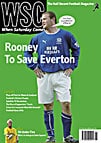 Liverpool seem bedevilled by uncertainty. Reds fan Robert Fordham wonders why
Liverpool seem bedevilled by uncertainty. Reds fan Robert Fordham wonders why
Too often, a book about one season at a club suffers from being out of date the moment it is published. It no doubt upsets John Williams no end that Liverpool are the same gutless and passionate, half-decent and diabolical, outdated and forward-thinking collection of skilled players and hopeless ones that they were in 2002-03. It certainly upsets me.
It is easy to forget that a book on last season starts with Liverpool reflecting on finishing second in the league, with 80 points, the first team to reach that mark in 38 games without taking the title; likewise the first time a team finished ahead of Manchester United without being champions since 1991. Yet luckily for the validity of The Liverpool Way, the decline Williams traces may have slowed but has not been reversed. Only the changes at Chelsea, just mentioned but before the scale of Roman Abramovich’s spending became clear, are missing.
With an open ear to those around him and by sharing his own changing reactions, Williams produces an honest diary, albeit one with too much emphasis on drinks and travel detail for many, even if the landlord of the Flat Iron will be pleased with the publicity. The wider claims that this is “also the story of the changing game in England”, the appeal to the general reader, are undermined early on by some needless parochialism, intended jokes about Everton that are merely off-putting jibes. Also Liverpool are in a unique position – global support which in this satellite age only Manchester United of English rivals need not envy, yet forever falling short of the big prizes that would enable them to exploit that fully. Not much room for empathy here, because Liverpool performing to potential would worsen the position of every club in the country.
It is a book of qualifications and paradoxes. Williams can rail against the effects of the Premier League Rick Parry helped create on football in general and Liverpool in particular; against the G14 and its elitism as expounded by Parry. He can sit in the Kop week in, week out and bemoan the decisions of Gérard Houllier during the game and his excuses after it. Yet he can interview both men and come away liking both, without having soft-pedalled in the questions.
Because the crisis is not on the scale of, say, the one at Leeds. The sense here is that Liverpool are going nowhere. Not up, not down, locked in fifth-place limbo. Even the proposed stadium move, though emotionally a major leap, is geographically a minor one. Yet at the same time as standing still, Williams says: “Liverpool seemed in a permanent state of transition.”
Players, too, attract mixed reviews. To Williams Jamie Carragher is “a loyal trier – if a blindingly limited one”. A compliment and a slap at the same time, and you get the sense that if this line had been written after the recovering defender chose to continue his recuperation by sitting in the away end at Middlesbrough this season, Williams would have moved the clauses around and concluded with “blindingly loyal”. We like many of these people: we just wish they could be that bit better before time runs out. There is not so much anger as frustration, tinged with fear that in fact standing still is slipping back, that the remaining advantages of past success will fade, leaving only bitterness among those left, creating insurmountable pressure to end the continued failure.
So are Liverpool going up, down, or treading water? Any honest answer would change from day to day, minute to minute as the recent suppression of Birmingham City showed. Williams shares his confusion in a confusing book, which is therefore in tune with the team he writes about and the experience of supporting them.
From WSC 203 January 2004. What was happening this month